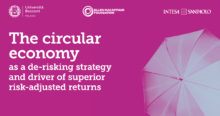The Ellen MacArthur Foundation published a white paper, in collaboration with Bocconi University and Intesa Sanpaolo, that sets out new evidence demonstrating how circular economy strategies can de-risk investments and drive superior risk-adjusted returns for investors and financial institutions.
Bocconi University’s analysis of 200+ European, publicly listed companies across 14 industries shows that the higher the circularity of a company, the lower its risk of defaulting on debt, and the higher the risk-adjusted returns on its stock.
The paper reveals how circular economy strategies can reduce investment risk by decoupling economic growth from resource consumption, diversifying business models, and allowing businesses to better anticipate stricter regulation and changing customer preferences. Embedding circular economy principles also reduces exposure to supply chain disruptions and volatility of resource prices.
The circular economy is increasingly recognised by the financial sector as a value creation opportunity that delivers on goals related to climate and other global challenges. The paper sets out a case study of European bank and Strategic Partner to the Foundation Intesa Sanpaolo, which is pursuing better growth by:
- setting the circular economy as a strategic priority;
- innovating in financial products and adopting proactive circular economy credit policies and lending strategies;
- actively supporting the development of the circular economy market; and
- exploring the integration of the circular economy into risk models.



